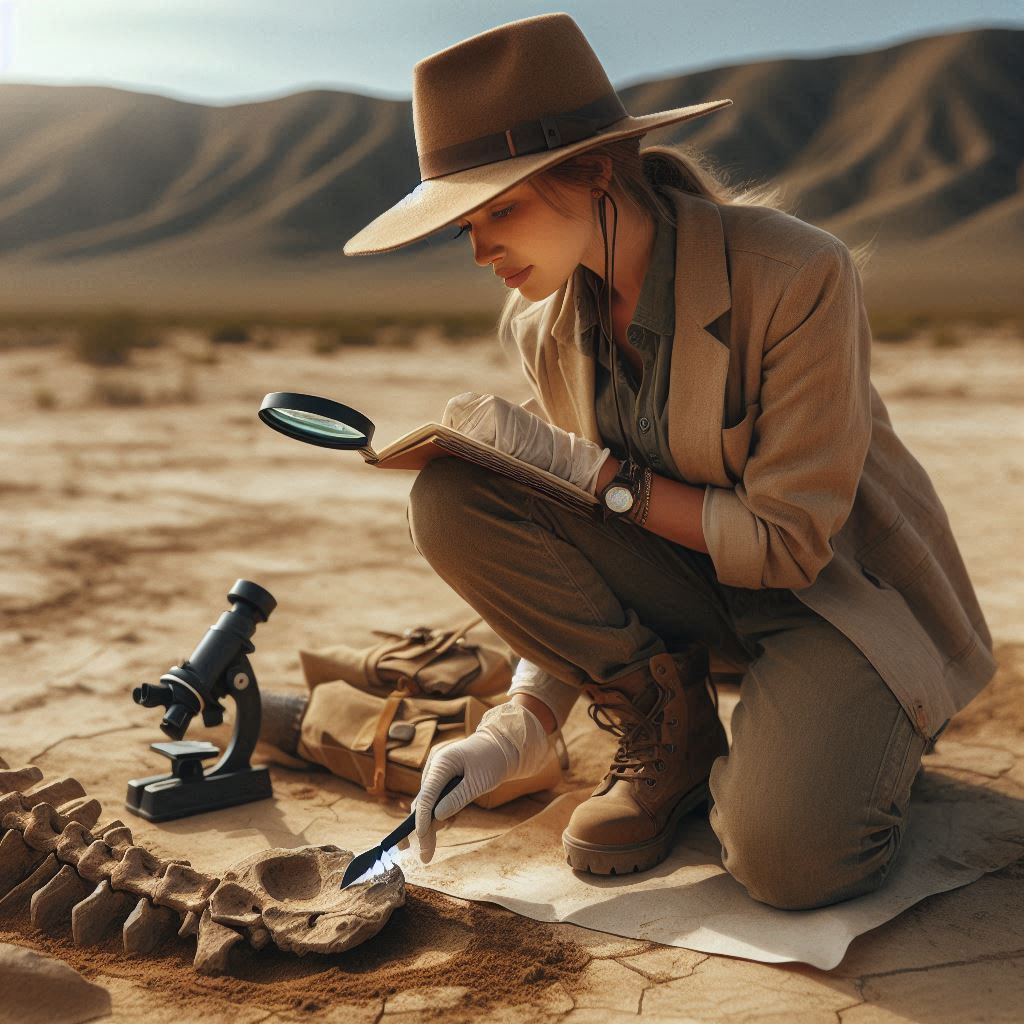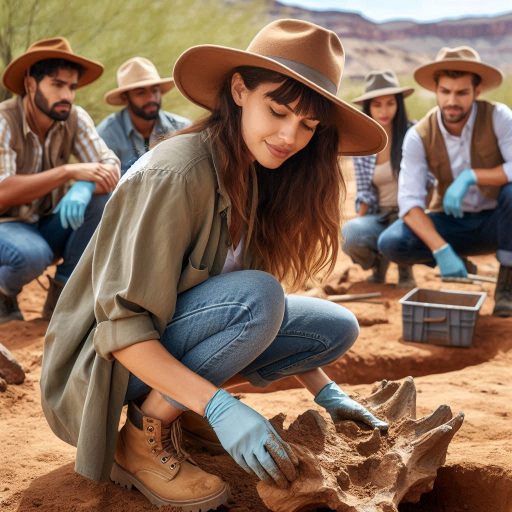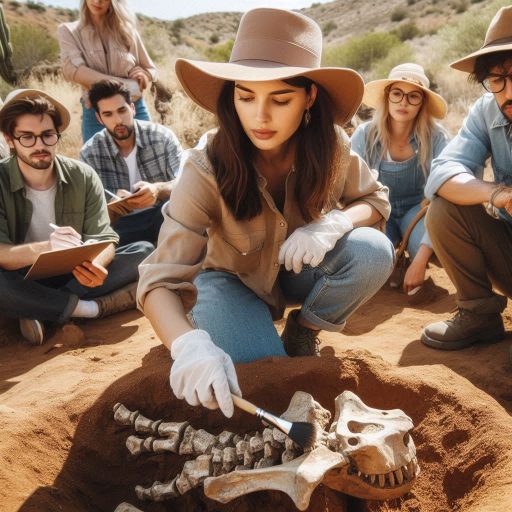Introduction
Balancing fieldwork and research is essential in archaeology.
Fieldwork allows archaeologists to collect data and artifacts directly from sites.
It provides firsthand insights that are critical for understanding historical contexts.
Meanwhile, research plays a vital role in analyzing this data.
It helps archaeologists interpret findings and form theories about past societies.
This balance between fieldwork and research is crucial for project success.
Effective fieldwork generates a wealth of information, but without proper analysis, its value diminishes.
Researchers must rigorously evaluate the data collected during fieldwork.
This evaluation transforms raw data into meaningful conclusions that advance archaeological knowledge.
Furthermore, maintaining this balance fosters collaboration among team members.
Fieldworkers and researchers must communicate regularly to share insights and findings.
This ongoing dialogue enhances the overall quality of archaeological projects.
When fieldwork and research are aligned, archaeologists can maximize their impact.
Ultimately, achieving a harmonious balance leads to more comprehensive archaeological investigations.
It ensures that discoveries are thoroughly analyzed and accurately presented.
As a result, the field of archaeology continues to grow, enriching our understanding of human history.
Importance of Fieldwork in Archaeology
Significance of fieldwork in collecting data and artifacts
Fieldwork serves as the foundation of archaeological research.
It allows archaeologists to collect data and artifacts directly from excavation sites.
This hands-on approach provides a wealth of information that cannot be obtained through secondary sources.
By engaging with the physical context of artifacts, archaeologists gain invaluable insights into past cultures and societies.
Fieldwork facilitates the discovery of artifacts in their original contexts.
Finding items in situ helps researchers understand their use and significance.
The spatial relationships between artifacts provide crucial clues about past human behavior.
For instance, a cluster of pottery near a hearth indicates domestic activities.
Such discoveries contribute to a comprehensive understanding of historical lifestyles.
Moreover, fieldwork helps archaeologists develop essential skills.
They learn to use various tools and techniques for excavation and documentation.
Mastery of these skills enhances the quality of research and analysis.
Experienced archaeologists can identify subtle differences in artifacts that may reveal important information.
Fieldwork also fosters collaboration among team members.
Archaeologists often work alongside specialists, students, and local communities.
This collaboration enriches the research process and broadens perspectives.
Engaging with different viewpoints leads to more nuanced interpretations of findings.
How fieldwork provides firsthand experience and insights for archaeologists
Additionally, fieldwork creates opportunities for public engagement.
Open excavation sites often attract interest from local communities and the public.
This interaction promotes awareness of archaeological practices and the importance of preserving cultural heritage.
Fieldwork can also inspire future generations to pursue careers in archaeology.
Furthermore, fieldwork generates excitement and motivation for researchers.
The thrill of uncovering artifacts and understanding their stories drives archaeologists to pursue their work passionately.
This hands-on experience can rekindle interest in long-standing research questions and inspire new avenues of inquiry.
Fieldwork remains essential for validating hypotheses and theories.
Collecting empirical data directly from sites allows archaeologists to test their ideas effectively.
The insights gained from fieldwork often lead to unexpected discoveries, challenging previous assumptions and expanding knowledge.
Fieldwork plays a critical role in archaeology.
It provides a tangible connection to the past and enhances research quality.
By collecting data and artifacts firsthand, archaeologists gain essential insights into historical contexts.
This process fosters collaboration, public engagement, and excitement for the field.
Ultimately, fieldwork is indispensable for understanding our shared human history.
Read: Botany Career Fairs and Networking Events
Importance of Research in Archaeology
Role of research in analyzing and interpreting data
Research plays a crucial role in archaeology.
It allows archaeologists to analyze and interpret the data collected during fieldwork.
By systematically studying artifacts, researchers can uncover patterns and relationships within the data.
This analysis helps to create a comprehensive picture of past societies and their behaviors.
Data analysis involves various methodologies, including statistical techniques and comparative studies.
Archaeologists use these methods to identify trends and draw meaningful conclusions.
For example, analyzing the distribution of artifacts can reveal insights into trade networks and cultural exchange.
Through rigorous research, archaeologists can understand how ancient communities interacted with one another.
Research also aids in contextualizing artifacts within their historical framework.
It allows archaeologists to connect their findings to existing knowledge.
This contextualization enriches our understanding of past cultures and their significance.
Without research, the data collected would remain isolated and lack meaningful interpretation.
Moreover, research enables archaeologists to critically evaluate previous studies and theories.
Engaging with existing literature helps identify gaps in knowledge and areas for further exploration.
By building upon prior research, archaeologists contribute to a cumulative understanding of the past.
This process is essential for advancing the field of archaeology.
How research helps in forming theories and conclusions about archaeological sites
Furthermore, research is fundamental for forming theories and conclusions about archaeological sites.
As archaeologists gather and analyze data, they develop hypotheses to explain their findings.
These hypotheses drive further investigation and experimentation, leading to a deeper understanding of archaeological contexts.
Theories formulated through research guide future fieldwork and analysis.
For instance, if an archaeologist proposes a theory about settlement patterns, subsequent excavations can test that hypothesis.
This iterative process of theory testing and refinement is crucial for advancing archaeological knowledge.
Research also helps to address questions of cultural significance.
By analyzing artifacts and their contexts, archaeologists can make informed interpretations about societal values and practices.
These insights contribute to our understanding of human behavior and cultural evolution.
Additionally, research fosters collaboration among archaeologists and other disciplines.
Interdisciplinary approaches enhance data interpretation and theory development.
Collaborating with historians, geologists, and other experts provides diverse perspectives on archaeological findings.
Research is vital in archaeology.
It allows for the analysis and interpretation of data collected during fieldwork.
By forming theories and drawing conclusions, research enhances our understanding of past societies.
Engaging with existing literature and collaborating across disciplines further strengthens archaeological research.
Ultimately, research serves as the backbone of archaeological inquiry, driving the field forward and enriching our comprehension of human history.
Read: Preparing for a Botany PhD: Tips and Advice
Challenges of Balancing Fieldwork and Research
Common challenges faced by archaeologists in balancing fieldwork and research
Archaeologists face several challenges when balancing fieldwork and research.
The demands of fieldwork can often overshadow research activities.
Long hours spent on excavation and data collection can leave little time for analysis.
Consequently, this imbalance can hinder the development of theories and interpretations.
Fieldwork requires extensive physical and logistical planning.
Archaeologists must manage teams, resources, and equipment while maintaining safety standards.
This focus on fieldwork can divert attention from essential research tasks.
As a result, researchers may rush through data analysis, leading to incomplete interpretations.
Another challenge arises from the need to document findings.
Archaeologists must record data meticulously during excavations.
This process can be time-consuming and may take precedence over subsequent research.
The pressure to document every detail can overwhelm researchers, leaving little room for deeper analysis.
Additionally, the seasonal nature of fieldwork adds to the challenge.
Many archaeological projects occur within specific time frames, often dictated by weather conditions.
Once the field season ends, researchers may feel the urgency to analyze their data quickly.
This rushed pace can compromise the quality of research outcomes.
How time constraints and resources can impact the balance
Time constraints significantly impact the balance between fieldwork and research.
Archaeologists often juggle multiple projects and deadlines.
This multitasking can lead to inadequate time for thorough research and analysis.
Researchers may find themselves prioritizing immediate fieldwork needs over long-term research goals.
Moreover, limited funding can exacerbate these challenges.
Many archaeological projects rely on grants and donations.
When funding is scarce, archaeologists may focus more on fieldwork to secure future grants.
This focus can shift attention away from conducting meaningful research and publishing findings.
Resource availability also affects the balance between fieldwork and research.
Archaeologists often work with limited access to laboratory facilities or specialized equipment.
This limitation can delay data analysis and hinder the overall research process.
Without adequate resources, researchers may struggle to keep up with their analysis.
Collaboration can help alleviate some of these challenges.
Team members can share responsibilities, allowing for a more equitable division of tasks.
However, coordination among team members requires effective communication.
If not managed well, teamwork can become an additional challenge rather than a solution.
Archaeologists face significant challenges in balancing fieldwork and research.
Time constraints, resource limitations, and the demanding nature of fieldwork can disrupt this balance.
To overcome these challenges, researchers must prioritize effective planning and collaboration.
By addressing these issues, archaeologists can ensure that both fieldwork and research receive the attention they deserve.
This balance ultimately enhances the quality of archaeological inquiry and contributes to a deeper understanding of the past.
Read: Interdisciplinary Research: Botany and Other Sciences
Strategies for Efficient Fieldwork
Tips for conducting effective fieldwork to maximize data collection
Effective fieldwork is crucial for maximizing data collection in archaeology.
Begin by setting clear objectives for your excavation project.
Define what data and artifacts you aim to collect before starting.
This clarity helps focus your efforts and avoid unnecessary distractions.
Develop a comprehensive fieldwork plan.
Include timelines, resource allocation, and team roles in this plan.
Distributing responsibilities among team members enhances efficiency.
Everyone should know their specific tasks and goals to maintain productivity.
Utilize technology to streamline data collection.
Employ digital tools for recording data, such as tablets or mobile applications.
These tools allow for immediate documentation and reduce the chances of errors.
Additionally, consider using GPS and GIS technologies to map your findings accurately.
Organize your excavation site efficiently.
Create designated areas for sorting artifacts, documenting data, and storing equipment.
An organized workspace minimizes confusion and increases productivity during fieldwork.
Regularly review and adjust your organization system as needed.
Conduct thorough training for your team.
Ensure all members understand their tasks and the project’s objectives.
Familiarize them with equipment and data recording methods.
This preparation enhances overall efficiency and reduces mistakes during fieldwork.
Encourage open communication among team members.
Establish regular check-ins to discuss progress and challenges.
Addressing issues promptly helps maintain momentum and keeps everyone aligned with project goals.
Ways to streamline fieldwork processes for better research outcomes
Streamlining fieldwork processes is essential for improving research outcomes.
Start by prioritizing tasks based on their importance and urgency.
Identify which activities require immediate attention and which can wait.
This approach helps allocate resources efficiently and maintains focus.
Implement a systematic approach to data collection.
Use standardized forms or templates for documenting findings.
Consistent documentation allows for easier data analysis later.
Moreover, it reduces the likelihood of confusion or misinterpretation.
Schedule regular breaks to maintain team morale and productivity.
Fatigue can diminish efficiency, leading to errors in data collection.
Regular breaks help refresh the team and keep motivation high throughout the fieldwork process.
Consider conducting pilot tests before the main excavation.
A small-scale test run can identify potential challenges and streamline processes.
This approach allows you to make necessary adjustments before full-scale fieldwork begins.
Incorporate flexible strategies in your fieldwork plan.
Be prepared to adapt to unforeseen circumstances, such as weather changes or equipment malfunctions.
Flexibility allows the team to respond effectively to challenges and maintain productivity.
Utilize post-excavation reviews to enhance future fieldwork.
After completing a project, gather the team to discuss what worked and what didn‘t.
Analyzing experiences fosters continuous improvement and helps refine strategies for subsequent projects.
Efficient fieldwork requires careful planning, organization, and open communication.
By implementing these strategies, archaeologists can maximize data collection and streamline processes.
Ultimately, effective fieldwork leads to better research outcomes and deeper insights into the past.
Read: Women in Botany: Celebrating Pioneers and Leaders

Strategies for Efficient Research
Organizing and analyzing data collected during fieldwork
Organizing and analyzing data collected during fieldwork is essential for effective research in archaeology.
Begin by establishing a clear data management system.
Use software programs designed for data analysis, such as Excel or specialized databases.
These tools allow for efficient storage, retrieval, and analysis of data.
Create a standardized format for data entry.
Ensure that all team members use the same template when recording findings.
Consistency in data entry reduces errors and facilitates easier analysis later.
Additionally, include metadata with each entry to provide context about the data collected.
Utilize visual aids to help organize data.
Create charts, graphs, and maps to represent findings clearly.
Visual representation allows researchers to identify patterns and trends more easily.
This approach enhances comprehension and supports deeper analysis.
Conduct regular data reviews throughout the research phase.
Schedule meetings to discuss findings and assess progress.
These reviews help ensure that data remains organized and allows for immediate adjustments.
Early detection of issues prevents complications later in the research process.
Prioritize data validation to enhance accuracy.
Cross-check findings with original field notes and recordings.
This practice confirms the integrity of the data and reduces the chances of errors affecting conclusions.
Encourage team members to double-check their work regularly.
Consider employing qualitative analysis methods to supplement quantitative data.
Analyzing artifacts or site context can provide rich insights into cultural practices.
Incorporating qualitative analysis enhances the overall understanding of findings.
Importance of collaboration and communication in the research phase
Collaboration and communication are vital during the research phase of archaeology.
Foster an environment that encourages team members to share insights and ideas openly.
Regular discussions promote knowledge exchange and stimulate innovative approaches to research.
Establish clear communication channels among team members.
Utilize tools such as Slack or Trello to facilitate ongoing conversations.
Effective communication ensures that everyone remains informed about progress and any challenges faced.
Engage in interdisciplinary collaboration when possible.
Involve experts from other fields, such as anthropology or geology, to enrich the research process.
Diverse perspectives can lead to more comprehensive interpretations of findings and enhance the overall quality of research.
Create a shared document repository for all research materials.
Use cloud-based platforms like Google Drive to ensure easy access for all team members.
A centralized location for documents promotes collaboration and streamlines communication.
Encourage mentorship within the research team.
Pair experienced archaeologists with those who are newer to the field.
This approach fosters knowledge transfer and helps develop skills in research methodologies.
Regularly share progress updates with stakeholders and the archaeological community.
This transparency keeps everyone informed about ongoing research and encourages feedback.
Engaging with the broader community can lead to valuable insights and collaborative opportunities.
Efficient research requires a strategic approach to organizing data and fostering collaboration.
By implementing these strategies, archaeologists can enhance their research processes and contribute meaningfully to the field.
Effective communication and collaboration ultimately lead to deeper insights and richer interpretations of archaeological findings.
Importance of Communication between Fieldwork and Research Teams
Need for clear and continuous communication between fieldwork and research teams
Clear and continuous communication between fieldwork and research teams is crucial in archaeology.
Each team plays a distinct role, contributing unique insights to the overall project.
Regular communication ensures that both teams remain aligned on project goals and objectives.
When team members communicate openly, they can address issues immediately.
This proactive approach prevents misunderstandings that may arise during fieldwork.
Establishing communication protocols before starting the project enhances efficiency.
Set up regular meetings to discuss progress and share findings.
These meetings create a platform for team members to voice concerns and ask questions.
Encourage team members to utilize collaborative tools, such as shared documents or messaging apps.
This way, everyone stays informed and can provide input in real-time.
Utilizing visual aids during communication can improve understanding.
Maps, diagrams, and charts help convey complex information effectively.
Visual representations allow teams to identify discrepancies and areas needing further investigation.
Regularly updating these materials keeps everyone on the same page.
Additionally, documenting discussions and decisions is essential.
Keep detailed records of meetings and share them with all team members.
Written documentation serves as a reference point and helps maintain accountability.
This practice also ensures that everyone can follow the project‘s evolution, reducing the chances of miscommunication.
How effective communication can enhance the overall success of archaeological projects
Effective communication significantly enhances the overall success of archaeological projects.
When fieldwork and research teams work closely, they can share real-time observations and insights.
This collaboration leads to more informed decision-making during fieldwork.
Timely feedback from researchers can guide fieldwork strategies.
For example, researchers may identify specific artifacts or contexts to focus on based on previous findings.
This targeted approach improves the efficiency of data collection and increases the relevance of findings.
Moreover, effective communication fosters a sense of teamwork and shared purpose.
When team members feel connected and informed, they are more motivated to contribute.
This increased morale can lead to higher productivity and better outcomes for the project.
Addressing challenges collaboratively is another benefit of effective communication.
Fieldwork often presents unexpected issues, such as inclement weather or equipment failures.
When teams communicate openly, they can brainstorm solutions together.
This collaborative problem-solving approach leads to quicker resolutions and minimizes project delays.
Clear and continuous communication between fieldwork and research teams is essential in archaeology.
Establishing protocols, utilizing visual aids, and documenting discussions enhances collaboration.
Ultimately, effective communication leads to informed decision-making and increased project success.
By prioritizing communication, teams can foster a positive and productive working environment, ensuring that archaeological projects achieve their goals.
Gain More Insights: Plant Science Conferences to Attend in 2024
Discover More: Materials Scientist: Impact on Renewable Energy Solutions
Case Studies of Successful Balancing of Fieldwork and Research
Examples of archaeological projects that have successfully balanced fieldwork and research
Many archaeological projects exemplify the successful balance between fieldwork and research.
One notable example is the Pompeii Archaeological Park in Italy.
Researchers conducted extensive fieldwork to uncover and preserve artifacts.
They simultaneously analyzed their findings, allowing them to refine excavation techniques continuously.
This dual approach enhanced the understanding of Pompeii’s daily life before the eruption of Mount Vesuvius.
Another successful project occurred at the archaeological site of ‘atalh‘y‘k in Turkey.
Researchers adopted a collaborative approach between fieldworkers and analysts.
They integrated fieldwork with ongoing research, leading to new insights about ancient agricultural practices.
This balance allowed for immediate data analysis, which informed subsequent excavation strategies.
In the United States, the Mesa Verde National Park project demonstrates effective balance as well.
Archaeologists excavated ancient Puebloan sites while simultaneously studying the artifacts found.
This strategy enabled them to reconstruct the social and cultural practices of the ancestral Puebloans.
Transform Your Career Today
Unlock a personalized career strategy that drives real results. Get tailored advice and a roadmap designed just for you.
Start NowKey takeaways and lessons learned from these case studies
Several key takeaways emerge from these successful projects.
First, collaboration is crucial.
Fieldworkers and researchers must engage throughout the project.
Regular meetings and open communication ensure alignment on goals and findings.
Second, the integration of technology improves efficiency.
Utilizing tools like GIS (Geographic Information Systems) facilitates real-time data analysis.
This technology allows teams to visualize spatial relationships between artifacts, enhancing their understanding of site dynamics.
Third, flexibility in strategies enhances project outcomes.
Teams that adapt their research methods based on field discoveries experience greater success.
For example, when unexpected artifacts surface, researchers should adjust their focus to explore these findings thoroughly.
Fourth, thorough documentation is essential.
Maintaining detailed records of fieldwork and research enhances the overall understanding of archaeological contexts.
This practice creates a valuable resource for future studies and provides insights for others in the field.
Lastly, investing in training for team members leads to better outcomes.
Ensuring that fieldworkers possess research skills fosters a more integrated approach.
This dual expertise encourages team members to engage with both fieldwork and research effectively.
Successful archaeological projects demonstrate the importance of balancing fieldwork and research.
Collaboration, technology integration, flexibility, thorough documentation, and training contribute to project success.
By learning from these case studies, archaeologists can improve their practices and enhance the overall impact of their work.
Balancing fieldwork and research leads to more comprehensive understandings of the past and enriches the field of archaeology.
Conclusion
Balancing fieldwork and research is crucial in archaeology.
Effective fieldwork provides essential data and artifacts that enhance research outcomes.
Simultaneously, thorough research allows for deeper analysis and interpretation of these findings.
Collaboration among team members strengthens the connection between fieldwork and research.
Open communication ensures everyone remains aligned on project goals.
When fieldworkers and researchers share insights, they enrich their understanding of archaeological contexts.
Successful archaeological projects rely on the integration of fieldwork and research.
This balance leads to more accurate interpretations and significant discoveries.
Each phase informs the other, creating a feedback loop that enhances overall project quality.
Additionally, adopting technology and tools improves efficiency and data analysis.
Regular meetings and updates promote a culture of collaboration, fostering team cohesion.
Flexibility in approaches enables teams to adapt to new discoveries and refine their strategies.
Archaeologists must prioritize balancing fieldwork and research.
By emphasizing collaboration and communication, they can enhance project outcomes.
Continued efforts in these areas will ultimately contribute to a more comprehensive understanding of our past.
[E-Books for Sale]
The Big Book of 500 High-Paying Jobs in America: Unlock Your Earning Potential
$19.99 • 500 High-Paying Jobs • 330 pages
Explore 500 high-paying jobs in America and learn how to boost your career, earn more, and achieve success!
See All 500 High-Paying Jobs of this E-Book
1001 Professions Without a Degree: High-Paying American Jobs You Can Start Now
$19.99 • 1001 Professions Without a Degree • 174 pages
Discover 1001 high-paying jobs without a degree! Unlock career tips, skills, and success strategies for just $19.99!




